Why the Sheridan-Brent marraige failed!
Ann reveals the reasons for her breakup with Brent. Exclusive!
by Liza (January, 1943 - Screenland)
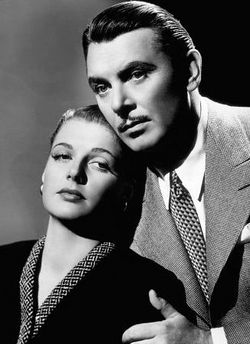
Even the natives of Hollywood, who live in a general state of confusion anyway, were terribly bewildered when they read in their morning newspapers that the wildly publicized Ann Sheridan-George Brent marriage of less than nine months had come to an abrupt end. That was on Monday morning. And a Monday morning is hard enough to take, without confusion thrown in.
Saturday before, an evening paper reported, "George Brent on his first day as a flying instructor at Oxnard lined up his men and gave them a brief outline of the routine that they had to follow. When Brent finished," he said," 'Is there anything else I can do for you?' Sure, replied one of the new flyers, 'get us a picture of Ann Sheridan.' "
Sunday before, a columnist had written, "George Brent spent last weekend with Ann Sheridan at Del Monte where Ann is with the Edge of Darkness location. Ann and George are more in love than ever."
Then boom-the bust-up! No wonder Hollywood was bewildered by it all. "Hollywood divorces are old hat," said the natives, sadly shaking their heads, "but this is different. Ann and George were so well suited to each other. It doesn't seem possible. It's very confusing."
The only people who were confused, strangely enough, were Ann's and George's friends. Their confusion had come nine months earlier when George and Ann had married in Florida, at the home of George's sister, Mrs. Sam Harris. (And a few weeks after story was published in a magazine entitled 'Why I won't marry Ann Sheridan' by, of all people, George Brent. Which story made a lot of people say there's a word for George Brent--the same word used to describe Achilles' vulnerable spot. However, we in the trade were not quite as ruthless. George, probably, was only having his little joke with the press.)
"I'm sure I'll never know why Ann and George married," one of Ann's more discerning friends said to me last winter. "I never saw two people more mismated. George is a guy who has had his fill of the
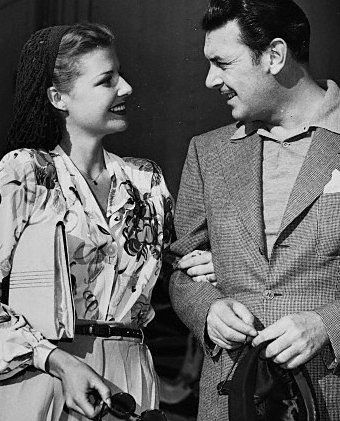 good
things of life, for 10 years he's been on top, and he's pretty
bored with it all. Ann is just getting into her stride, she's
having her first taste of fame, and being a normal girl she
finds it thrilling. That marriage won't work out, believe me."
good
things of life, for 10 years he's been on top, and he's pretty
bored with it all. Ann is just getting into her stride, she's
having her first taste of fame, and being a normal girl she
finds it thrilling. That marriage won't work out, believe me.""George's essentially a romanticist," one of George's friends told me at the time of the wedding. "He is always looking for an ideal. But once she obtains is ideal it no longer holds any attraction for him. George is a man of the world, charming, cultured, sophisticated. Ann is a good, hard-working, easy-going kid from Texas. Their marriage won't last six months, I'll make book on that."
All that -- as we who know Ann and George realize -- makes a lot of sense.
George Brent struck pay dirt in the Hollywood Hills ten years ago when, at the age of 29, he was chosen by Ruth Chatterton, the First Lady of the Screen at the time, to play opposite her in The Rich Are Always With Us. George was such a hit in the picture he was immediately placed under long-term contract by Warner Bros., where he has been ever since, at an upper bracket salary.
(George has not been drafted yet, but he recently offered his services to Uncle Sam, and is now a flying instructor at Oxnard, California. His contract at Warner Bros. has three months to run.)
As the husband of the First Lady, and later as the number one actor on the Warner lot, George has been badly spoiled for years by the studio, by Hollywood, by women, by everyone who has come in contact with them. Not that George wanted to be spoiled, but it follows stardom just as inevitably as night follows day.
Even before Hollywood, George's life was full of adventure and excitement.
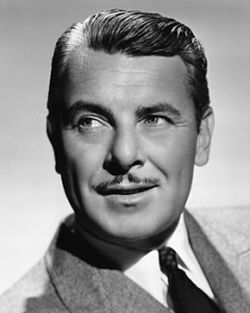 He
had been an attractive young man with radical ideas in London's
political world of 1920; he had been popular and fawned-upon
matinee idol in New York, Denver, and other American cities; and
most exciting of all, for many months he had been a dispatch
carrier in his native Ireland between Michael Collins,
revolutionary leader, and De Valera, famous champion of the
fighting Irish.
He
had been an attractive young man with radical ideas in London's
political world of 1920; he had been popular and fawned-upon
matinee idol in New York, Denver, and other American cities; and
most exciting of all, for many months he had been a dispatch
carrier in his native Ireland between Michael Collins,
revolutionary leader, and De Valera, famous champion of the
fighting Irish.Since settling down in Hollywood on us four-figure-a-week salary George has lived well. He has had yachts and planes and fancy cars, not to mention innumerable romances with the first, second, and third ladies of the screen. George should be pretty bored with it all by now.
Ann, on the other hand, at 27, has just begun to enjoy life in Hollywood at its most pleasant best. Ever since she left Denton, Texas, and came to Hollywood in 1933, she has worked her fingers down to the knuckles trying to get a firm hold on the elusive ladder of fame. Ann has been pushed around plenty. She's has had to live down both the silly 'search for beauty' campaign, and the cheap 'oomph girl' publicity.
Ann is not good at selling herself. In spite of her red hair she is not given to temperaments and tantrums, so her progress as an actress has been slow in unexciting. But in Kings Row she proved to all her critics that she could play an intelligent dramatic role just a superbly as Bette Davis or Margaret Sullavan. Since then Ann's career has been on the up-swing. Only recently has she received a salary in keeping with her status as a star. After eight years of grinding hard work, Ann has her first sip of success. She isn't bored with anything or anybody. She wants to live. She wants to act. Most of all, she wants a laugh.
Brent's friends who called him a romanticist eternally seeking an ideal probably hit the nail on its proverbial head. George, at one time or another, has romanced nearly every glamour girl in Hollywood, including Greta Garbo,
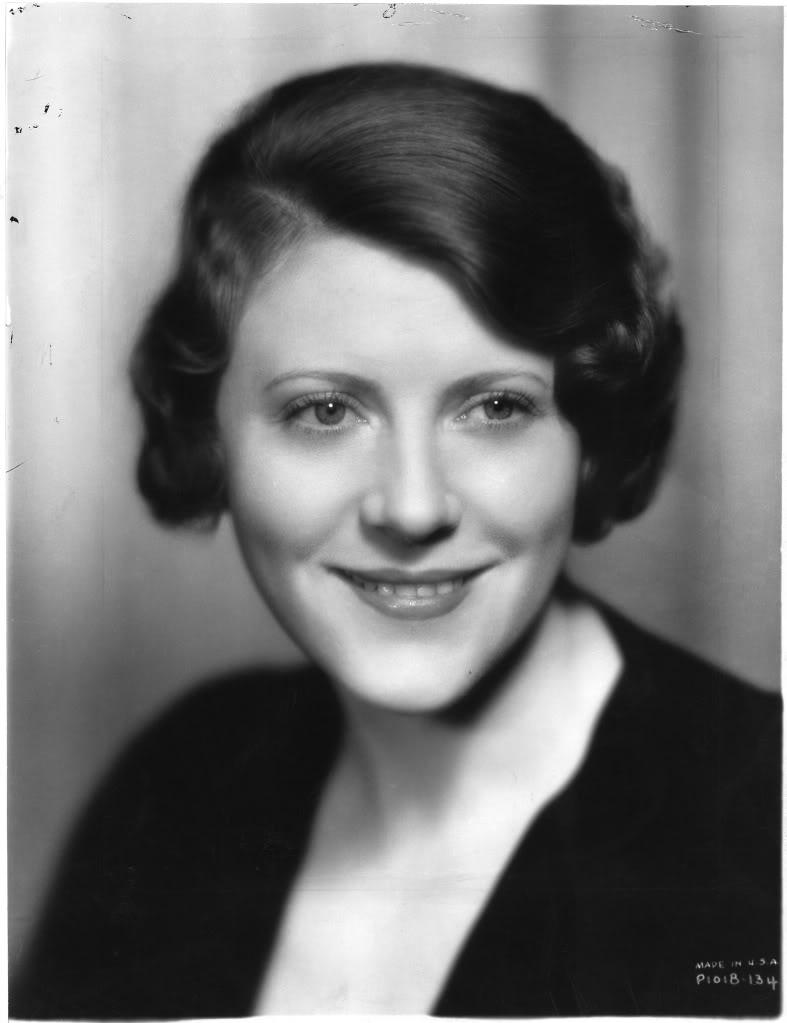 Bette
Davis, Loretta Young, Merle Oberon, Constance Worth, and Olivia
de Havilland. But his romances never lasted very long. Ruth
Chatterton holds the track record with a year and eight months.
Bette
Davis, Loretta Young, Merle Oberon, Constance Worth, and Olivia
de Havilland. But his romances never lasted very long. Ruth
Chatterton holds the track record with a year and eight months.My nickel's worth is that George Brent, with that arrogant independence that was instilled in him by his grandfather when he was a child in Ireland, until it became part of his being, is rather like Pygmalion. And Galatea is very bad casting for Ann Sheridan.
Several days after the separation was announced I had lunch with Ann in the Green Room at Warner Bros. Ann was covered with mud. Ann apologized for being so messy. As Karen Stensgard in the powerful anti-Nazi Edge of Darkness (in which and co-stars with Errol Flynn) she has another dramatic role which is a cinch to bring her further laurels from the critics. That day Ann had been participating in some guerrilla fighting in the rain-soaked hills of Norway, and mud is very muddy these days of priorities.
"Until last Sunday," said Anne,"George hadn't spoken much for a month. He finally called me in Del Monte and asked if he might come up for the weekend, and I said okay, please come -- but he went to Lancaster instead. Sunday he drove down from Oxnard and arrived at my ranch in the Valley at about four o'clock in the afternoon. From four o'clock until late that night we talked things over. George very frankly told me what was wrong with me, and that took some time. Among other things he called me a career girl. Simply because I sat up one night reading the script of Texas Guinan, because I found it so interesting I couldn't put it down. Imagine me, a career girl! Finally I said, well George, it looks like this is it. We agreed that I was to call Alex Evelove, head of publicity at the studio on Monday morning and give him a statement for the newspapers."
But George jumped the gun on Ann. He phoned the newspapers early next morning and said, "It is the last thing in the world I wanted. But I don't see what I can do about it. Ann wants her freedom and she's going to issue a statement explaining that her marriage is finished."
George has never been palsy-walys with the press. Ann has. As a matter fact, I sat near Ann and George in the Beachcomber's on one of their rare nights out last summer. George had hurt his hand in You Can't Escape Forever and it was beginning to swell. Ann ordered a bowl of cracked ice. George said sourly, "Well I hope the press don't see me. They'll say I socked you." Well, for one who doesn't like the press, I must say George ran to them awfully fast when he wanted sympathy.
"I'm sure the fact that we had two homes had
The wars blamed for everything these days. It might as well be blamed for the failure of the Sheridan-Brent marriage.
"George suffers from a shyness that is out of this world," Ann continued. "I used to think he was pretending when he said he didn't like people, but after I married him I discovered that it was really a phobia with them. Someone at the studio would invite us to dinner, and George would accept with the utmost charm. But by the time we'd gotten home and has ready to dress for dinner, George would've talked himself into a state of abject misery. We'd end up staying home. Once he accepted an invitation to party Ann Sothern was giving. All evening he was gay and witty, entered into all the fun, laughed, told jokes, and, believe it or not, we were the last to leave. I think Ann was getting ready to sweep us out. I was worn and weary, but I thought this is wonderful, George has gotten over his phobia. He likes people at last, but I was wrong. The next time we we're invited some place he was miserable as ever. We stayed home."
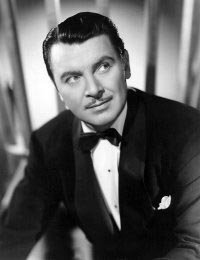 George,
according to his friends, has been anti-social all his life.
When he finishes a picture he doesn't celebrate, as most actors
do, by a whirl at the nightclubs, or a flying visit to the gay
bistros in New York, or a hunting trip with the boys in Mexico.
When he finishes a picture George goes to the hospital and
rests.
George,
according to his friends, has been anti-social all his life.
When he finishes a picture he doesn't celebrate, as most actors
do, by a whirl at the nightclubs, or a flying visit to the gay
bistros in New York, or a hunting trip with the boys in Mexico.
When he finishes a picture George goes to the hospital and
rests.While Ann, unlike George, simply adores people. All kinds of people. She's as friendly as a kitten and is cordial as a politician in October. For instance, I had lunch at her house one Sunday, the year before the Sheridan-Brent romance started. It was like a scene out of My Sister Eileen. During the afternoon there must have been forty or more people at the house, including four members of the press, Cesar Romero, her best friend Gwennie, two girls from wardrobe, an agent, the plumber, the family next door, and the entire rumba band from a downtown nightclub with their Mexican wives and sweethearts. Our conga chain was sensational.
Ann's friends at studio (who consider Mr. B. a bit of a snob) claim that George has always resented Ann's friendship with the boys and girls at the studio. Ann's entrance into the Green Room at the studio at noon used to cue a near-riot. Everybody from the messenger boy to the director wanted to tell Ann their latest joke. Ann would throw back her head, laughed appreciatively, and say "Brother that's a honey." Ann could take that Green Room out of the dumps in nothing flat.
Suddenly Ann didn't appear at the Green Room any more. She told the people on her set that George had decided she wasn't eating enough, and made her come home to lunch every day where he had ordered well-prepared meals for her. Ann's studio friends were pretty mad. They took it personally. But they shouldn't have. George is hepped on the subject of health and vitamins (a hangover from his friendship with the equally hepped Miss Garbo) and no doubt his interest in Ann's diet was quite sincere. Ann is the kind of girl who has no imagination about food. At the studio she orders the same lunch every day -- scrambled eggs, bacon, butter toast, fried potatoes, of which she takes about four bites. Then she starts laughing and joking, and pushes everything aside. One of the biggest fights the Brents ever had was over dish of carrots.
George's moroseness, his defeatism, and his gloomy fatalistic attitude towards life are things the poor guy probably can't help, and Ann would be the last to criticize. Those "Black Irish" moods that descend upon him regularly, driving him to the very depths of despair, are doubtlessly a heritage from his proud ancestors, who for generations suffered beneath the cruel heels of the English tyrants, who robbed and laid waste their land south of the River Shannon. George would like to throw off his moroseness. But he has been steeped in it too long. When one of those black moods envelops him he is as cheerless as a corpse at a funeral. Not very pleasant for young wife who likes to laugh, who can make a wise-crack even at life's darkest moment.
The Brent defeatism is famous at the studio where his work for ten years.
"George always looks on the black side," one of the employees there told me. "He seems to think that life is trying to give him a rotten deal. Whereas, we all think that life has been pretty good to him. He has no reason to complain. Imagine, a yacht, a plane, a bank account, Garbo, Davis and Sheridan, all in one lifetime!"
"Two questions, please," I asked Ann, "and I'll let you go and save Norway. First, you must have known that George was morose, shy, and anti-social before you married him, so why did you marry him? And second, do you think you'll ever marry an actor again?"
"Number one," replied Ann. "Of course, you know all about a person before you marry him. Or at least you think that you do. After marriage you naturally expect the rough spots to smooth themselves out, as your mutual understanding deepens. But until you're man and wife, settle down under one roof, you don't actually know a person. Sometimes marriage does strange things to people who have presumably been compatible during a romance. The very things that were once attractive suddenly become the very things that one or the other tries to change. Possessiveness sets in. Not matter how much you have in common, a marriage cannot last if one tries to dominate the other's life."
"Number two. Will I ever marry and actor again? Hit me with a brick if I ever do."
Then as she rose from the table, pushing aside quantities of scrambled eggs, bacon, buttered toast and friend potatoes, she added, "No don't! I might change my mind."
Return from "Why the Sheridan-Brent Marraige Failed" to Ann Sheridan Article Main Page